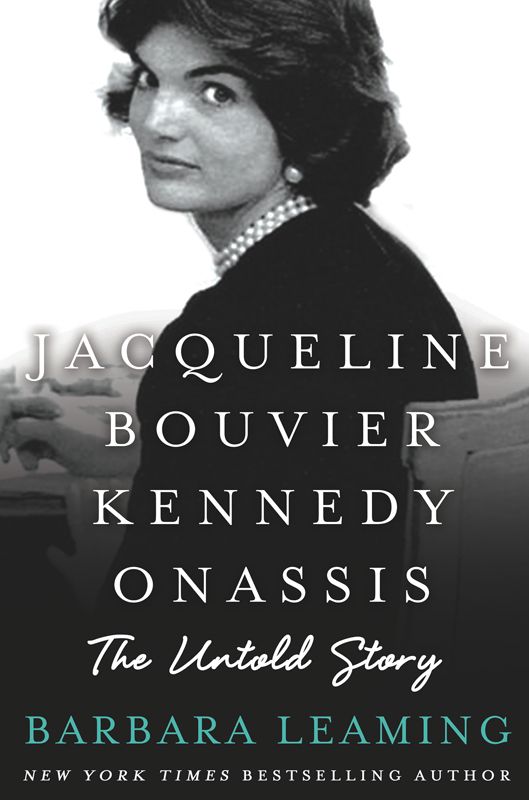
Jacqueline Bouvier Kennedy Onassis--The Untold Story
کتاب های مرتبط
- اطلاعات
- نقد و بررسی
- دیدگاه کاربران
نقد و بررسی

September 1, 2014
Much has been written about J.F.K.’s first lady, who was generational icon, but Leaming (Churchill Defiant) approaches Jackie’s story from a new perspective, contending that she suffered from PTSD, with all of its recurrent triggers and episodes. The first half of book focuses on Jackie’s early life and marriage; the second half is an examination of Jackie suffering in the wake of her husband’s traumatic assassination. Leaming explains Jackie’s behavior and reactions to specific events through the lens of contemporary knowledge about human reactions to trauma. For instance, her marriage to Aristotle Onassis is explained in terms of what it provided for her for a short time: safety. The possibility that Jackie had PTSD was first suggested in a letter from U.K. Prime Minister Harold Macmillan. Leaming draws the parallels between what Jackie went through and the cases of others who experienced trauma. Well-written and engaging, the book presents readers with yet another facet of a woman who has intrigued and beguiled the public for decades.

September 1, 2014
A best-selling biographer chronicles the fabled life of Jackie Kennedy (1929-1994) and advances the claim that the former first lady spent the bulk of her post-Camelot life battling PTSD.Jacqueline Bouvier seemed to have it all: an upper-crust upbringing and personal and social connections to the most elite families in America. Yet when the time came for her to wed, she was determined to escape "the bland predictability" of a high-society marriage that would require little else of her but to cater to the needs of a well-heeled husband. She met her match in "bad boy" John Kennedy, who she believed was her ticket to all the excitement she could ever want. JFK's larger-than-life ambition brought the young couple international fame, but it also forced an essentially private woman to endure the brutal glare of the media spotlight and gradually transformed a dream into a nightmare long before JFK's murder. Beset by personal difficulties, including two infant deaths and a foundering marriage, the assassination-to which she bore bloody witness-was the final straw. Leaming (Churchill Defiant: Fighting On 1945-1955, 2010, etc.) reveals that Jackie suffered from all the hallmarks of PTSD: sleep disturbances, obsessive ruminations about her husband's murder and even thoughts of suicide. The assassinations of Martin Luther King Jr. and her beloved brother-in-law, Robert, in 1968 became triggers for even more psychological instability and led her to wed Greek shipping magnate Aristotle Onassis, who she falsely believed would provide her the safety and distance she craved. Hounded by paparazzi and reviled by an American public eager to forget the historical traumas of the 1960s, Jackie nevertheless managed to build a life for herself on her own terms-rather than those dictated to her by her class-and emerge from tragedy, permanently wounded but "comparatively sane." An intimate and revealing look at one of the 20th century's most remarkable-and misunderstood-women.
COPYRIGHT(2014) Kirkus Reviews, ALL RIGHTS RESERVED.

October 15, 2014
Jacqueline Kennedy Onassis's life (1929-94) was one of privilege and wealth but much sadness and illness, too, claims Leaming (Churchill Defiant) in this engaging biography. Described are Jackie's debutante life and her subsequent less-than-storybook marriage to John F. Kennedy, in which she endured his infidelities and watched him suffer from debilitating back pain. Leaming then presents a convincing case that Kennedy struggled with post-traumatic stress disorder (PTSD) following her husband's assassination and for the remainder of her life. Several examples of PTSD triggers discussed here include the former first lady's constant retelling of the assassination story, her anguish over not having done more to save Jack, her thoughts of suicide, and her compulsive need to guard herself and her children from all possible harm. The author attributes Jackie's marriage to Aristotle Onassis to the desire to find someone whose power and wealth could protect her. Ultimately, Onassis created a satisfying life for herself as an editor for Viking and Doubleday, which ended with her death at age 64 from non-Hodgkin's lymphoma. VERDICT Readers intrigued with the Kennedys will find much to admire here. See Greg Lawrence's Jackie As Editor for a current work about Kennedy's years in publishing. [See Prepub Alert, 5/4/14.]--Karl Helicher, Upper Merion Twp. Lib., King of Prussia, PA
Copyright 2014 Library Journal, LLC Used with permission.

Starred review from November 1, 2014
She went from beloved First Lady and noble widow of a fallen hero to much-maligned and -pursued celebrity. Leaming argues that for much of Jackie's life in the public eye, some 30 years, she was struggling to recover from the trauma of her husband's assassination in 1963. Jackie started out as a spirited young woman who spurned a safe marriage and pursued an exciting young senator, then spent 10 years coping with his infidelities. Jackie developed her own political savvy and fought to be more than a useful tool to her husband and his powerful father. Just at a point when she felt her marriage was progressing, it ended in trauma. Drawing on interviews and archival material, Leaming offers horrific detail of Jackie's ordeal of watching her husband's murder and the long, painful recovery from what would be now diagnosed as post-traumatic stress disorder. Jackie self-medicated with alcohol and even considered suicide. She married Onassis, thinking that his wealth would protect her and her children from the mounting violence in the U.S. in the tumultuous 1960s, but she couldn't escape the inner chaos. Jackie's later career in publishing, while viewed as a newfound feminism, was really about coping by keeping busy. Leaming tells a heart-wrenching story of a woman who not only endured a horrific event but also struggled to recover and was often misunderstood as she eventually carved out a life of her own making.(Reprinted with permission of Booklist, copyright 2014, American Library Association.)

























دیدگاه کاربران